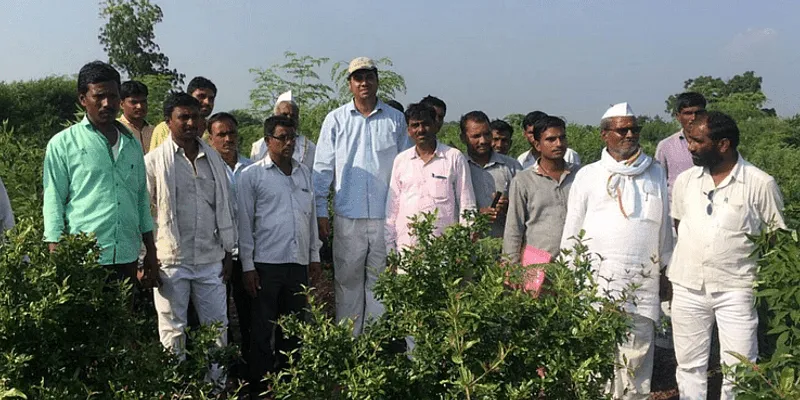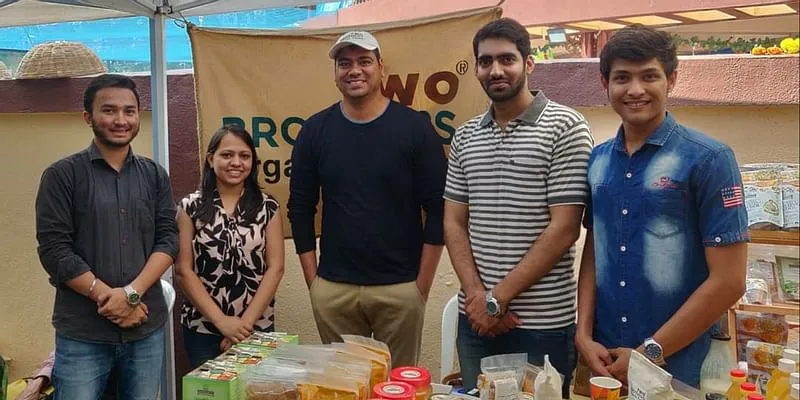Meet the 2 brothers who gave up their banking careers for organic farming and empowered 9,000 farmers
Satyajit Hange and Ajinkya Hange, two brothers from Bhodani, Pune, quit their careers as bankers to start their organic farm. They have launched several initiatives to create awareness among farmers on the importance of organic farming.
In Bhodani village near Pune, there’s a lush green organic farm which is rich in its soil nutrients. The farm, managed by two brothers, clocks a yearly turnover of Rs 12 crore.

Satyajit Hange and Ajinkya Hange
Satyajit Hange (39) and Ajinkya Hange (36) quit their jobs as bankers to start the own organic farm in 2014 – Two Brothers Organic farm (TBOF). Despite coming from a farming background, the brothers were kept away from farming since their childhood.
The two brothers completed their education from kindergarten to their graduation in Pune, where they also worked for a few years. They then spent time across India’s metro cities for about seven to eight years before they found their calling in farming.
“When we were young, farming was not a very lucrative occupation and hence we received our education outside our village. But we used to visit our farm during holidays and these visits developed an interest in us towards farming,” Satyajit tells SocialStory.
“The joy we got from farming was immense. So, we left our jobs at the banks and entered the farm land, purely driven by the love for farming.”
From joy to passion
The brothers learnt from their co-workers in the farm that the productivity of farms had fallen drastically.
“Before we started, we realised that there was lesser produce in most of the farms due to decreased soil fertility and also because of inorganic farming practices. Moreover, the availability of water was going down, and so was active labour,” explains Satyajit.
“We had knowledge of organic farming, but not many around us were implementing it. We started meeting farmers across India who were doing unconventional farming,” he adds.
Organic farming was practised in some remote pockets in different parts of the country, but not in a manner that was economically viable.
“The day we learnt about the ill-effects of chemical fertilisers that were being used, we stopped using them. We went back to using cow dung as manure to fertilise our plants,” says Satyajit.
Traditional manure like cow dung ensures that the soil receives the micro and macro nutrients. They also mulched their farms with organic waste to add to the fertility.
While mono-cropping leads to the depletion of one particular nutrient, poly-cropping helps increase soil fertility, soil particle size, water retention capacity, and ultimately increases the farm biodiversity.
“We started experimenting with poly-cropping and today we have a food forest in our farm consisting of a variety of fruits, vegetables, and 25 to 30 varieties of plants which include medicinal plants,” says Satyajit.
Understanding the market
Papaya was one of their first trials. Satyajit says even though it did not look appealing from its exterior look, it tasted sweet. However, markets did not approve of their prices since they went by the external appeal of the fruit.
“We started developing our brand TBOF and took our produce to malls and markets, and have now entered the online space,” says Satyajit.

A consumer looks at a product at a farmers' market.
When they established a model after four years of trial and error, the brothers had cultivated indigenous seeds and their own fertilisers and pesticides, drastically bringing down their farming costs.
“The actual market rates we got for the quality of our produce was three to four times higher than the local market. Through various community and non-profit initiatives, we spread awareness about the importance of organic produce, and succeeded in creating a higher realisation of our market which influenced our local farmers,” says Satyajit.
Making a difference
Gradually, TBOF saw many visitors and farmers from across India and 14 different countries who observed its farming activities. The government of Maharashtra also sent farmers from across the country to learn more about their farming practices.
In the past six to seven years, Satyajit and Ajinkya have trained more than 9,000 farmers in organic farming. The two even visit their farms to assess and tell them how they can improve their produce.
The brothers have also aggregated farmers around their village and supported them to make their farm organic and also help them in marketing their produce.
“Once they were certified by us in their training, we took the produce from the farmers and tested them in our chain. The value that we gave the farmer was about 35 to 50 percent more than the rates they got for the same produce outside.”

Farmers at TBOF. (Image: TBOF)
TBOF has supported organisations like OrganicWe, a non-profit body that provides a platform for organic farmers to sell their produce. With OrganicWe, they started the initiative ‘Project 100 Organic Farmers’ to help farmers practice sustainability with sustainable incomes.
They have also organised several farmer meets and sessions to educate them on the importance of organic farming and the benefits of it.
Funding and turnover
“We initially sold our organic fruits on hand carts and made people aware of the importance of organic produce. During this period, our customer base grew. We have distributed our products to 45,000 customers in over 34 countries and 664 cities worldwide, apart from India,” says Satyajit.
There is no third party. Everything is sold online and dispatched within four to five days after the order is placed.

Ajinkya with team TBOF at a farmers' market
“In 2016, we had a yearly turnover of Rs 2 lakh. But now we see an average turnover of about Rs 12 crore a year. We have come long way,” says Ajinkya.
He says their main focus is to produce products which have a larger shelf life like traditionally made and nutritionally richer ghee, jaggery, moringa powder, and also a unique immunity boosting powder that was launched with the assistance of nutritionist Luke Coutinho.
“We make about 24 products including peanut butter, groundnut oil, traditional wheat flour, jowar varieties, and nutritionally-rich rice,” says Ajinkya.
Moving forward
In recent times, team TBOF distributed stocks worth almost half a million dollars (about Rs 3.6 crore) to all their employees – from the cow herder to the driver, following which everybody involved in the chain is now a stakeholder.
“The farmers took interest in organic farming and are now independent in their farming activities. We plan to start a training centre for farmers that will help them grow and harvest various plants and convert them into products.”
The brothers are also working on a tech solution that will give farmers details of rains, luminosity, winds, and other factors with various sensors attached to the device.
“With organic farming, we are helping a local community grow and also promoting a local diversity. Our aim is to empower local farmers and also spread the idea across the world,” says Satyajit.
Edited by Javed Gaihlot









